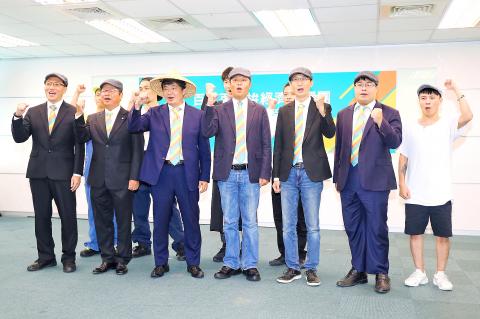The Democratic Progressive Party (DPP) yesterday announced the establishment of a new campaign unit to stump on economic issues in the run-up to the Nov. 24 nine-in-one elections.
At a news conference at its headquarters in Taipei, DPP Secretary-General Hung Yao-fu (洪耀福) said that the party has accomplished much in improving the economy, and sharing the fruits of that growth is an important objective of the party.
The DPP platform is defined by reform and creating an economy that will make Taiwan a more equitable, rich and powerful country, he said, adding that improved wages and tax cuts are thanks to the government.

Photo: CNA
Members of the unit are to travel throughout the nation and share their experiences, as well as explain the economic achievements of President Tsai Ing-wen’s (蔡英文) administration, he said.
In an apparent endorsement of the DPP, heads of the Taiwan Confederation of Trade Unions, Federation of Craft Workers Unions and Chung Hwa Rotary Educational Foundation also spoke at the news conference.
The labor incidents bill that the DPP administration is drafting is sympathetic to workers’ interests, Taiwan Confederation of Trade Unions secretary-general Tai Kuo-jung (戴國榮) said.
The government’s draft bill is to place the burden of proof for workplace accidents on employers and improve workers’ accessibility to labor arbitration process, he said.
Should the bill become law, it would rectify the imbalance of power and access to information between employers and workers, he said.
“I support the administration because the labor incidents act would improve working conditions, and more importantly, it is a crucial step toward protecting labor rights and human rights in Taiwan,” he said.
The government has increased the minimum wage by 9.72 percent, or NT$1,992 (US$64.25), and additional increases planned next year are to bring the minimum wage to NT$23,100 per month and NT$150 per hour, Federation of Craft Workers Unions chairman Chang Chia-ming (張家銘) said.
The public had been skeptical of the government’s ability to increase the minimum wage, because it had been unable to do so for eight years when run by the Chinese Nationalist Party (KMT), he said.
“The numbers clearly show that the DPP administration can take care of underprivileged citizens without losing the support of its enterprises,” he said. “Steady increases of the minimum wage would guarantee that the fruits of the economy are shared by all.”
Foreign investments have increased by 75 percent from 2015 to last year, while foreign capital inflow in April was valued at US$2.47 million, representing an increase of 69 percent [baseline of comparison unavailable], Chung Hwa Rotary Educational Foundation chairman Chen Mao-jen (陳茂仁) said.
Google’s decision to expand its operations in Taiwan and Winbond Electronics Corp’s NT$335 billion investment in facilities in Kaohsiung are evidence that tax reforms and deregulation have boosted confidence in Taiwan’s business environment, he said.
The Tsai administration has undertaken important legal reforms that have improved the regulation of businesses, Lawyer Huang Di-ying (黃帝穎) said.
Over the past two years, the Financial Supervisory Commission has made a substantial effort to disentangle the financial sector from its ownership of industries, enhance oversight of business administration and build a fair national market, he said.

Chinese Nationalist Party (KMT) Chairman Eric Chu (朱立倫), spokeswoman Yang Chih-yu (楊智伃) and Legislator Hsieh Lung-chieh (謝龍介) would be summoned by police for questioning for leading an illegal assembly on Thursday evening last week, Minister of the Interior Liu Shyh-fang (劉世芳) said today. The three KMT officials led an assembly outside the Taipei City Prosecutors’ Office, a restricted area where public assembly is not allowed, protesting the questioning of several KMT staff and searches of KMT headquarters and offices in a recall petition forgery case. Chu, Yang and Hsieh are all suspected of contravening the Assembly and Parade Act (集會遊行法) by holding

PRAISE: Japanese visitor Takashi Kubota said the Taiwanese temple architecture images showcased in the AI Art Gallery were the most impressive displays he saw Taiwan does not have an official pavilion at the World Expo in Osaka, Japan, because of its diplomatic predicament, but the government-backed Tech World pavilion is drawing interest with its unique recreations of works by Taiwanese artists. The pavilion features an artificial intelligence (AI)-based art gallery showcasing works of famous Taiwanese artists from the Japanese colonial period using innovative technologies. Among its main simulated displays are Eastern gouache paintings by Chen Chin (陳進), Lin Yu-shan (林玉山) and Kuo Hsueh-hu (郭雪湖), who were the three young Taiwanese painters selected for the East Asian Painting exhibition in 1927. Gouache is a water-based

Taiwan would welcome the return of Honduras as a diplomatic ally if its next president decides to make such a move, Minister of Foreign Affairs Lin Chia-lung (林佳龍) said yesterday. “Of course, we would welcome Honduras if they want to restore diplomatic ties with Taiwan after their elections,” Lin said at a meeting of the legislature’s Foreign Affairs and National Defense Committee, when asked to comment on statements made by two of the three Honduran presidential candidates during the presidential campaign in the Central American country. Taiwan is paying close attention to the region as a whole in the wake of a

OFF-TARGET: More than 30,000 participants were expected to take part in the Games next month, but only 6,550 foreign and 19,400 Taiwanese athletes have registered Taipei city councilors yesterday blasted the organizers of next month’s World Masters Games over sudden timetable and venue changes, which they said have caused thousands of participants to back out of the international sporting event, among other organizational issues. They also cited visa delays and political interference by China as reasons many foreign athletes are requesting refunds for the event, to be held from May 17 to 30. Jointly organized by the Taipei and New Taipei City governments, the games have been rocked by numerous controversies since preparations began in 2020. Taipei City Councilor Lin Yen-feng (林延鳳) said yesterday that new measures by